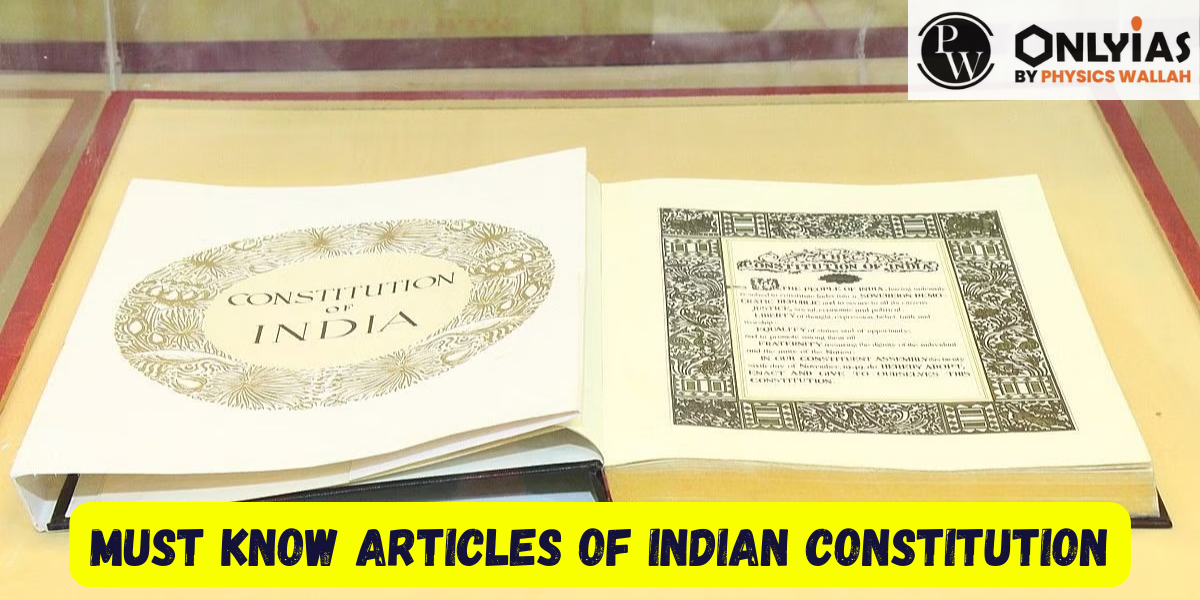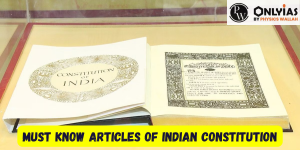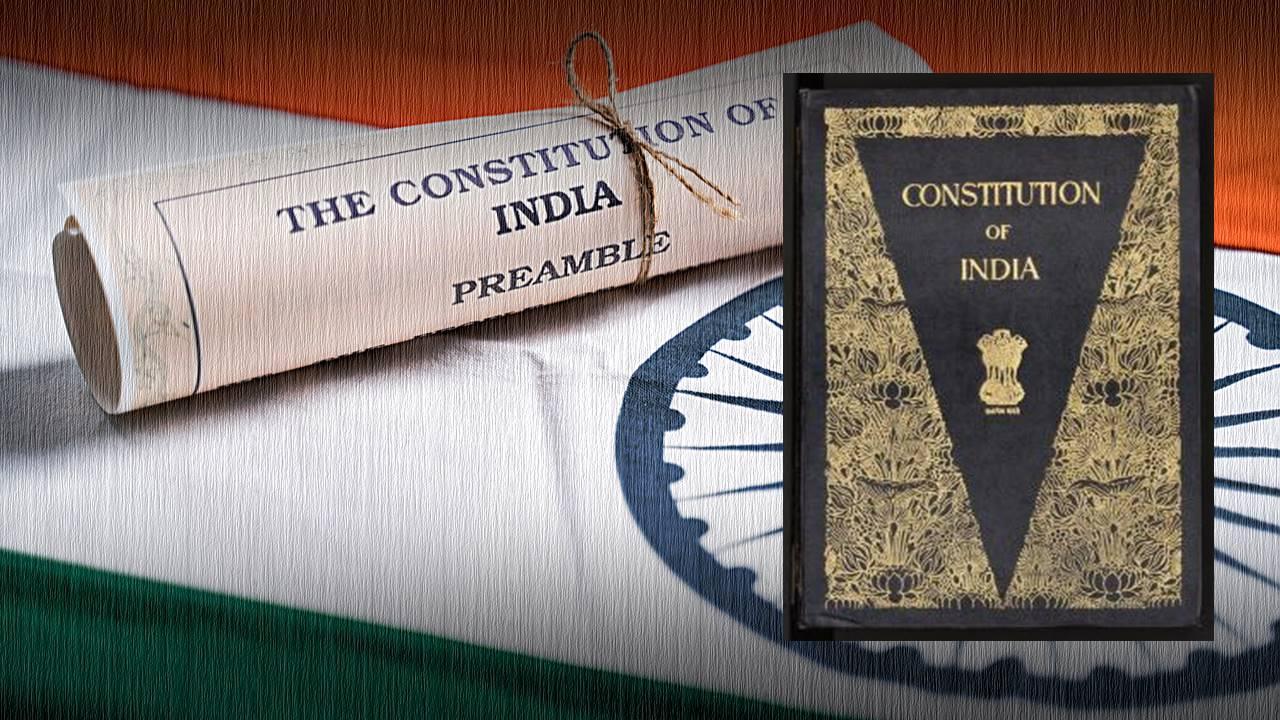
The Constitution of India, adopted on January 26, 1950, is a comprehensive and detailed document that serves as the supreme law of the country. It lays down the framework for the governance of India, enshrining the rights, responsibilities, and principles that guide the functioning of the nation. Within this extensive constitution, certain articles hold particular significance due to their impact on various aspects of Indian society and governance.
In this article we will see the list of Must know articles of Indian Constitution, that are very helpful for any aspirant of all the Government Jobs preparation.

Here is a list of some must know articles in the Constitution of India:
Must know articles of Indian Constitution |
||
|---|---|---|
| Part | Article Number | Description |
| PART 1 | Article 3 | Formation of new States and alteration of areas, boundaries or names of existing States |
| PART 2 | Article 8 | Rights of citizenship of certain persons of Indian origin residing outside India |
| Article 10 | Continuance of the rights of citizenship | |
| Article 11 | Parliament to regulate the right of citizenship by law | |
| PART 3 | Article 14 | Equality before law |
| Article 15 | Prohibition of discrimination on grounds of religion, race, caste, sex, or place of birth | |
| Article 16 | Equality of opportunity in matters of public employment | |
| Article 19 | Freedom of: speech and expression, peaceful assembly, association, movement, residence | |
| Article 20 | Protection in respect of conviction for offenses | |
| Article 32 | Right to constitutional remedies | |
| PART 4 | Article 39 | Certain principles of policy to be followed by the State |
| Article 41 | Right to work, to education and to public assistance in certain cases | |
| Article 43 | Living wage, etc., for workers | |
| Article 44 | Uniform civil code for the citizens | |
| PART 5 | Article 72 | Power of President to grant pardons etc., and to suspend, remit or commute sentences in certain cases |
| Article 80 | Composition of the Council of States | |
| Article 82 | Readjustment after each census | |
| Article 102 | Disqualifications for membership | |
| Article 123 | Power of President to promulgate Ordinances during recess of Parliament | |
| Article 124 | Establishment of Supreme Court | |
| Article 125 | Salaries of Judges | |
| Article 126 | Appointment of acting Chief Justice | |
| Article 127 | Appointment of ad–hoc judges | |
| Article 128 | Attendance of retired judge at sitting of the Supreme Court | |
| Article 129 | Supreme Court to be a court of Record | |
| Article 130 | Seat of the Supreme Court | |
| Article 136 | Special leaves for an appeal to the Supreme Court | |
| Article 137 | Review of judgment or orders by the Supreme Court | |
| Article 141 | Decision of the Supreme Court of India binding on all the courts | |
| Article 148 | Comptroller and Auditor– General of India | |
| Article 149 | Duties and Powers of CAG | |
| PART 6 | Article 153 | Governors of State |
| Article 154 | Executive Powers of Governor | |
| Article 161 | Pardoning powers of the Governor | |
| Article 165 | Advocate–General of the State | |
| Article 213 | Power of Governor to promulgate ordinances | |
| Article 214 | High Courts for states | |
| Article 215 | High Courts to be a court of record | |
| Article 226 | Power of High Courts to issue certain writs | |
| Article 233 | Appointment of District judges | |
| Article 235 | Control over Subordinate Courts | |
| PART 9 | Article 243A | Gram Sabha |
| Article 243B | Constitution of Panchayats | |
| PART 12 | Article 266 | Consolidated Fund and Public Accounts Fund |
| Article 267 | Contingency Fund of India | |
| Article 280 | Finance Commission | |
| Article 300 A | Right to property | |
| PART 14 | Article 312 | All– India–Service |
| Article 315 | Public service commissions for the union and for the states | |
| Article 320 | Functions of Public Service Commission | |
| PART 14A | Article 323A | Administrative Tribunals |
| PART 15 | Article 324 | Superintendence, direction and control of Elections vested in the Election Commission |
| Article 325 | No person to be ineligible for inclusion in or to claim to be included in a special, electoral roll on grounds of religion, race, caste, or sex | |
| Article 326 | Elections to the house of the people and to the legislative assemblies of states to be on the basis of adult suffrage | |
| PART 17 | Article 343 | Official languages of the Union |
| Article 345 | Official languages or languages of a state | |
| Article 348 | Languages to be used in the Supreme Court and in the High Courts | |
| Article 351 | Directive for development of the Hindi languages | |
| PART 18 | Article 352 | Proclamation of emergency (National Emergency) |
| Article 356 | State Emergency (President’s Rule) | |
| Article 360 | Financial Emergency | |
| PART 20 | Article 368 | Powers of Parliaments to amend the constitution |
The Indian Constitution commences with a concise declaration of its fundamental principles, embodying the essence of our nation. It serves as a guiding principle to assess and scrutinize the validity of laws and government actions, making the Preamble the heart of the Indian Constitution.
India, known as the world’s largest democracy, adopted its Constitution on 26th January 1950. A constitution forms the framework of rules and regulations that govern a country. The Indian Constitution comprises 448 articles, 25 parts, 12 schedules, and 104 amendments. These parts encompass various articles dealing with constitutional bodies, fundamental rights, legislatures, executive branches, and schedules.
Below is the list if top 10 Must know articles of Indian Constitution:
Article 1 defines India as a Union of States, including the territories specified in the First Schedule and such other territories as may be acquired. It lists the states and territories that constitute the nation.
Article 15 prohibits discrimination on grounds of religion, race, caste, sex, or place of birth. It ensures that no citizen shall be subject to any form of discrimination in access to public places or in matters relating to employment or education.
Article 19 guarantees the right to freedom of speech and expression, assembly, association, movement, and residence. It allows citizens to exercise these fundamental rights subject to reasonable restrictions in the interest of public order, decency, or morality.
Article 21 provides that no person shall be deprived of their life or personal liberty except according to the procedure established by law. It includes the right to live with dignity and encompasses various aspects of a person’s life.
Article 32 grants individuals the right to move the Supreme Court for the enforcement of their fundamental rights. It is regarded as the “heart and soul” of the Constitution, as it ensures that citizens can seek redressal when their rights are violated.
Article 44 directs the state to endeavor to secure a Uniform Civil Code for the citizens throughout the territory of India. It aims to harmonize personal laws based on religious practices and promote gender equality and social justice.
Article 72 empowers the President to grant pardons, reprieves, respites, or remissions of punishment or to suspend, remit, or commute the sentence of any person convicted of any offense.
Article 131 confers exclusive jurisdiction on the Supreme Court to hear disputes between the Government of India and one or more states or between two or more states.
Article 226 grants High Courts the power to issue writs for the enforcement of fundamental rights and for any other purpose within their jurisdiction.
Article 370 grants special autonomy to the state of Jammu and Kashmir, allowing it to have its own constitution and certain exclusive powers.

The Constitution of India is a comprehensive document that serves as the foundation for the governance of the nation. It contains numerous articles that cover a wide range of topics, rights, and principles that guide the functioning of the Indian democracy, that are Must know articles of Indian Constitution. Below is a list of some Must know articles of Indian Constitution:
1. Article 3: Formation of new States and alteration of areas, boundaries, or names of existing States.
2. Article 8: Rights of citizenship of certain persons of Indian origin residing outside India.
3. Article 10: Continuance of the rights of citizenship.
4. Article 11: Parliament’s power to regulate the right of citizenship by law.
5. Article 14: Equality before the law.
6. Article 15: Prohibition of discrimination on grounds of religion, race, caste, sex, or place of birth.
7. Article 16: Equality of opportunity in matters of public employment.
8. Article 19: Freedom of speech and expression, peaceful assembly, association, movement, and residence.
9. Article 20: Protection in respect of conviction for offenses.
10. Article 32: Right to constitutional remedies.
11. Article 39: Certain principles of policy to be followed by the State.
12. Article 41: Right to work, to education, and to public assistance in certain cases.
13. Article 43: Living wage, etc., for workers.
14. Article 44: Uniform civil code for citizens.
15. Article 72: Power of President to grant pardons, etc., and to suspend, remit, or commute sentences in certain cases.
16. Article 80: Composition of the Council of States.
17. Article 82: Readjustment after each census.
18. Article 102: Disqualifications for membership.
19. Article 123: Power of President to promulgate Ordinances during recess of Parliament.
20. Article 124: Establishment of the Supreme Court.
21. Article 126: Appointment of acting Chief Justice.
22. Article 137: Review of judgment or orders by the Supreme Court.
23. Article 141: Decision of the Supreme Court of India binding on all courts.
24. Article 148: Comptroller and Auditor-General of India.
25. Article 161: Pardoning powers of the Governor.
26. Article 213: Power of Governor to promulgate ordinances.
27. Article 226: Power of High Courts to issue certain writs.
28. Article 243A: Gram Sabha.
29. Article 266: Consolidated Fund and Public Accounts Fund.
30. Article 280: Finance Commission.
31. Article 300A: Right to property.
32. Article 312: All-India Service.
33. Article 324: Superintendence, direction, and control of Elections to be vested in an Election Commission.
34. Article 352: Proclamation of emergency (National Emergency).
35. Article 356: State Emergency (President’s Rule).
36. Article 368: Powers of Parliament to amend the constitution.
Articles in the Constitution of India Complete and Comprehensive List 2023
Article 370 of the Constitution of India: Complete Significance and Controversy
Article 32 is often considered the most important in the Indian Constitution. It grants citizens the "Right to Constitutional Remedies," allowing them to seek redressal for violations of their fundamental rights in the Supreme Court. This article serves as a critical safeguard for individual rights and acts as a check on the government's actions.
As of October 2022, the Indian Constitution stands as the lengthiest globally, consisting of approximately 470 articles distributed among 25 parts, 12 schedules, and 105 amendments. The Preamble, considered the essence of the constitution, holds significant importance. Previously, the Indian Constitution comprised 395 articles and 22 parts.
The Constitution of India has undergone several amendments over the years, resulting in its current version containing 448 articles. These 448 articles are categorized into 25 parts.
Articles 343 to 351 encompass the provisions related to languages in the Indian Constitution. As per these articles, the official language of the Union is Hindi written in the Devanagari script. Additionally, the international form of Indian numerals shall be used for official purposes of the Union.
<div class="new-fform">
</div>